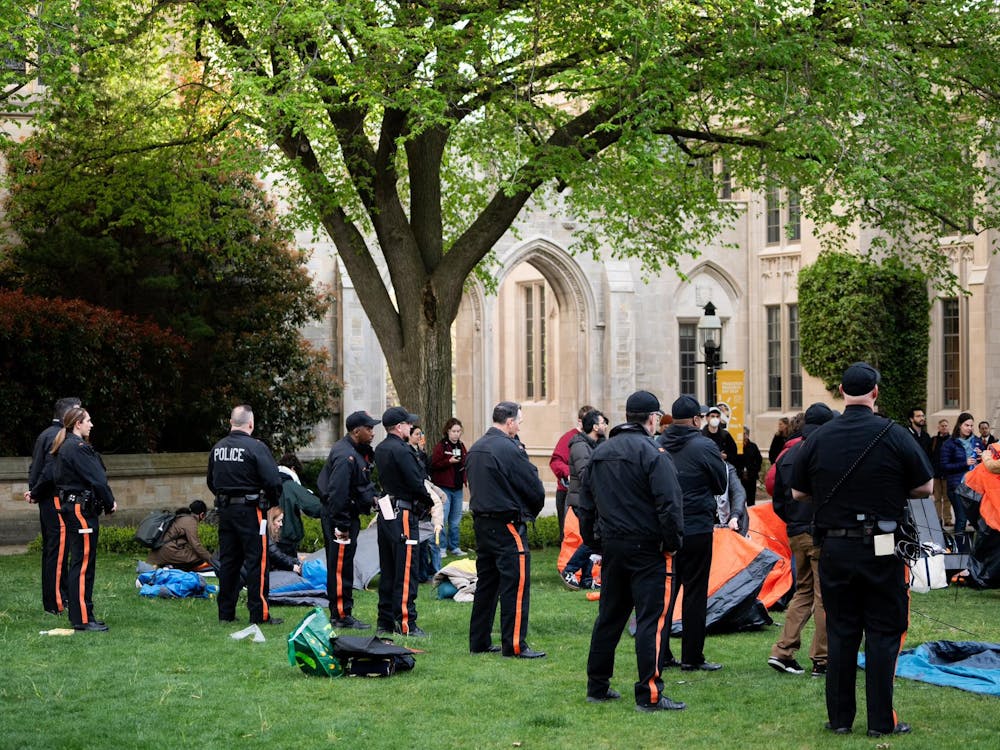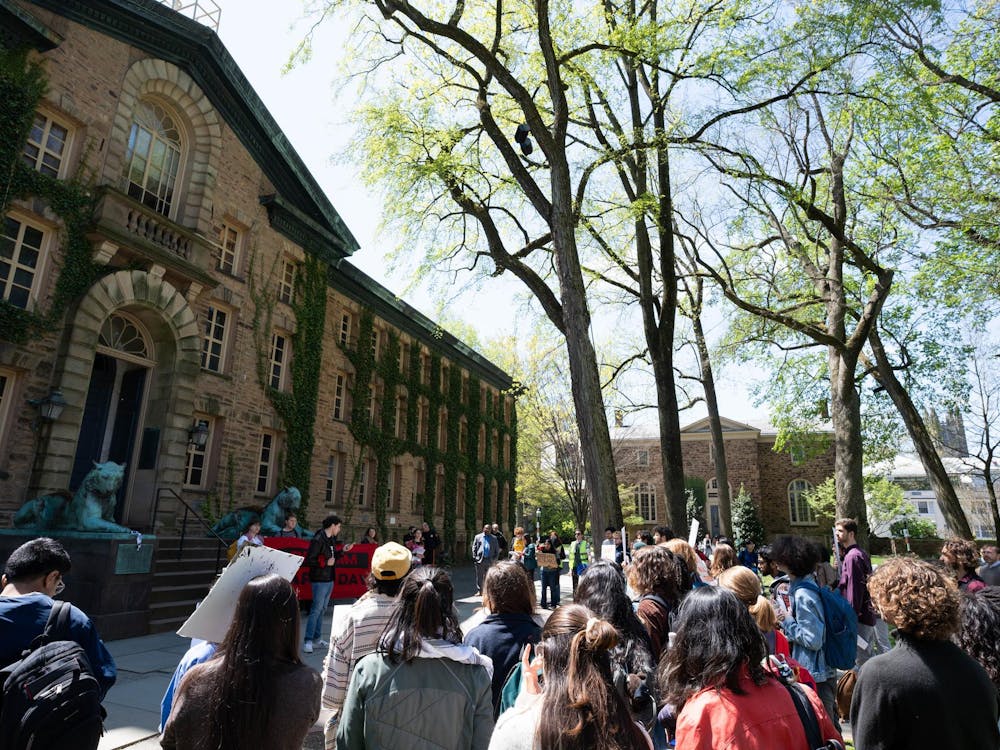Upon reading a recent article by guest columnist Luis Ramos ’13, in which he recalls his journey from cultural negation to cultural promotion and ultimately urges Princeton students to use their educational equipment to “help dismantle racism and prejudice,” I came away feeling both mildly inspired and mostly skeptical. Ramos asserts that “everyone can embrace the diversity that makes Princeton and this country so special,” but I’m not so sure if everyone can. I do not feel the need to mention what seems to me a palpable apathy toward discussions of race by the people who might benefit from them the most. Rather, I would like to focus on a particular social phenomenon that disables arguably the most agent leaders of discussions on race and ethnicity — that is, minorities with personal stakes in such matters — by necessitating their own cultural- and self-negation so that they might blend in and secure their candidacy for upward social mobility.
The “token” phenomenon, what we might know as either having or being the “token [insert race here] friend” of a predominantly racially homogenous group of people, can be seen as undeniably applicable to all races. The “token Korean international friend” of an all-Indian group, the “token white friend” of an all-black group, the “token Hispanic friend” of an all-white group: all represent several possible permutations of the “token” phenomenon. Being the welcomed pariah of an otherwise homogenous social group is not exclusive to racial minorities and is certainly not the same across cases (for example, being the “token Hispanic friend” of an all-white group may perceivably carry more prestige than being the “token Korean friend” of an all-Indian group), but I argue that the general case of the “token” minority among a majority class of people carries with it the greatest and often most dangerous implications on the condition of identity for the “token” individual.
My first real encounter with tokenism was my admittance into a predominantly white group of self-proclaimed beatniks (mostly “Twin Peaks” fanatics and “This American Life” enthusiasts) in my senior year of high school. I found their romantic nostalgia and wild theatricality to be alluring. They loved alternative culture — weird movies and numbing music and quick-witted banter — and that was cool, but it was really just alternative white culture. I appeared racially ambiguous enough and culturally silent enough to pose no threat to their impassioned and unfiltered discussions on technological singularity or upcoming music fanzines or contemptible fresh-off-the-boat Asians or how Kevin Hart is a banal black comedian. They rejected cultural nuance with a severe sense of entitlement and showed no interest in correcting their attitudes. I never told them that I had taken Vedic classes and had learned Indian classical dance for ten years — they didn’t care, and what’s worse, they didn’t want to know. I constantly felt that I had to choose between being agreeable and defending what I perceived to be an integral part of my heritage.
At Princeton, I am still reluctant to fully identify with this heritage. I am often met with a look of disappointment when someone finds out that I’m an Indian-American. I cringe with terror when I see my Indian friends self-segregate or flaunt their culture. I think: “Save yourselves and protect the illusion that you are something other than what you are!” Being the token is not a temporary state of being; it affects the way in which you connect with your heritage and ultimately your identity for a long time to come. It is a variable of rampant social homogeneity that persists even as our generation experiences a more diverse America.
According to a survey released by the Public Religion Research Institute (PRRI) in 2013, “fully three-quarters (75 percent) of white Americans report that the network of people with whom they discuss important matters is entirely white [while] Approximately two-thirds (65 percent) of black Americans report having a social network that is composed entirely of people who are also black [and] Less than half (46 percent) of Hispanics report that their social network includes only other people who also identify as Hispanic.” While the tendency toward racial homogeneity is prevalent among all racial groups, white Americans demonstrate the greatest homogeneity in the racial composition of their social networks: “91 percent of people comprising their social networks are also white, while five percent are identified as some other race.”
The “token” phenomenon then becomes an appropriate discussion for the minority individual in an otherwise entirely white American social network. To say that the token is a selection only made by homogenous social networks to ward off accusations of racism is to ignore the complexity of social dynamics, especially when applied to smaller social networks. While larger social networks, from Greek organizations to corporate structures, may actually practice the purposeful selection of minority recruits, the racial composition of our most intimate social circles is likely a result of who we truly get along with the most and not who provides us with the greatest confirmation of our identities as tolerant and cosmopolitan citizens. Still, we cannot deny the appearance of the “token” in homogenous social networks, large and small, and the effects of his unique social rank on his relationship to his culture.
At first glance, the “token” member of a homogenous nonwhite social group seems to occupy an undesirable role; neither does he benefit from the white stamp of approval nor can he ever fully identify with values, beliefs and experiences of the new culture in which he has taken up residence. At the least, however, he is exposed to a culture that is different from his own; at the worst, if his ideals clash with those of his friends, he can always retreat to the comfort of his own culture without the fear that he has permanently lost his advantage in the greater social hierarchy that we tend to uphold. He may walk away with scraped elbows and bruised knees, but he will ultimately recover.
The token minority of a white American social network seems to be insured by great social stability: he is perceived by white friends, colleagues, constituents and romantic interests as a non-threat since he has been sufficiently whitewashed, and as a result, may benefit from the perks that white people often receive. For example, if he’s lucky enough to find his image as whitewashed as Bobby Jindal’s official portrait, he might actually be “afforded the right to a political voice.” He is the unspoken envy of any non-white friends who desire white approval but were unable to unpack and ship off their cultural baggage in time to gain entry into exclusively white American social networks. He is applauded for his role among his white friends as the clean, listless and nonintrusive personality or, alternatively, the wonderfully raucous fool (calling attention to his personality as a diversion from his minority presence); and rarely needs to concern himself with the nuances of playing another part. As the only representative of his special type in his white American social network, he is conferred the responsibility of teaching his culture to his sometimes culturally illiterate friends and is simultaneously barred from doing so, since he only became the “token” as a result of having appeared to have risen above his culture. The “token” exists alone because, as the needle in the haystack, he proves no real threat to the harmony of homogeneity, but as he multiplies, he may find brotherhood in racial commonality and may force discomfort and awareness upon his otherwise blissfully ignorant friends. The “token” is accepted with caution by his network upon the implicit agreement that he continues to bleach his personality, and is largely lambasted in the meantime by members of his own race for having seemingly betrayed his own heritage.
I do not claim that homogenous white American social networks are solely responsible for cases of tokenism or that white Americans are even fully aware of it; we all naturally tend toward the people who make us feel the most comfortable in our own shoes, the people who don’t push us past the limits of what we are willing to understand. The tokens, however, are arguably the worst bystanders of racial ignorance, the individuals who have the greatest access to multiple racial networks and thus carry with them the greatest potential to engage these networks in informed racial discourse and yet, who often exercise this power the least. While it is most certainly not the private responsibility of the token to correct the prejudices of his friends, it is a disservice to his unique position of agency if he renounces this power.
I urge the tokens to embrace their cultural roots (if they are even still capable of recalling them) and see just what happens: they may be pleasantly surprised, or they may have to watch their reputations fall into a state of jeopardy. Either way, it’s worth the experiment when at stake is the reclamation of one’s most historical identity.
Reva Abrol is a sophomore from Syosset, NY. She can be reached at rabrol@princeton.edu.









